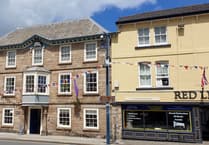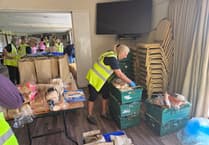WHEN I left school in December 1929 jobs in Okehampton were very,very scarce, and I was grateful when I answered an advertisement in the window of the Star Supply Stores and got the job as errand boy.
The manager at the time was Ted Pinney and he promised me an apprenticeship at the end of 12 months if I stayed with the company. That was what happened, and I then served my three years as an apprentice, learning all the tricks of the trade.
It ended with a trip to head office in London where I and another young lad named Fisher, from Crediton, spent a week in a store, where the only customers were company inspectors who tested us on all aspects of the trade. We both passed, and I still have my indentures to prove it.
In those days the staff in our shop was made up in the following way. The manager, Ted Pinney and later Jim Yolland. When Jim was made manager he was the youngest manager in the entire company.
Then came the provisions manager — 'Pethy' to us all, real name Mr Pethybridge. In those days his job was very skilled, as all the items, ie butter, fats, bacon, cheese etc, arrived in bulk. Sides of bacon had to be jointed, boned and sliced for the customers. Butter was patted with two wooden pats, often into fancy shapes. The cooked ham was a gammon joint, boned and rolled and cooked in a bucket of water with brown sugar and vinegar to improve the flavour, all done on a little gas ring and very popular with our customers.
Then came the roundsman. He was Cecil Mortimore and his job was to cycle around to all our out-of-town customers in the surrounding villages and farms. He had a leather case in a carrier on the back of his bike with his order book and weekly special offer. A popular special was a tin of pineapple chunks and a packet of custard powder for 7 1/2d. This was a very tough job in all kinds of weather, always at least ten hours a day and mostly twelve.
When Cecil left to work for another local grocer (Fretwells) I was working on a similar job at Tiverton. The company knew I was conversant with his round and I came back to do his job.
The country customers' groceries were parcelled up by the shop staff, and delivered by Lou Lobb (Tich) in the van. No charge was made for this service, which was recognised as a necessary service in those days when there was no other way, as very few people owned a car.
During my training I was the roundsman for Okehampton town and I too had my case and order book. I remember Painters Court and the ladies who worked hard doing the washing for the better off folk of Okehampton. Many an order ended blotchy as I tried to use my indelible pencil where boilers were steaming away as the washing boiled.
It was during a visit to one of my customers and I was sitting at the table writing down her order, when this beautiful auburn haired girl walked into the room and into my life. She was my customer's young sister, on holiday from London, and we were both 16. It was lovely. We were married for 58 wonderful years. But that is another story. Now back to work.
All the orders taken by me in and around the town were delivered by Norman Carter on his carrier bike. This was not an easy job and often meant pushing a loaded bike all the way to the camp, sometimes twice in a day.
May Hedderley (later May Yeo), together with Dick Walters and myself, were responsible for serving in the shop and putting up all the orders, parcelling them and sending them off.
We were also responsible for filling the shelves and weighing up and packaging all the sugar, flour, dried fruit, ie currants, etc. This was mostly done in the evenings after the shop was closed.
In those days sugar was delivered in 2cwt sacks which I well remember carrying in on my back on very wobbly legs. Flour came in sacks weighing 140lbs. All of these had to be bagged and weighted before sale — sugar mainly in 2lb bags and flour mainly in 3lb bags. Biscuits came loose in tins and were weighed as the customer required.
I haven't mentioned our cashier, Joyce Gratton. It was her job to deal with all the cash, both from shop customers and from the rounds, to make up the accounts and bank the takings. Hers was a very important job and May Hedderley later took her place.
During the period in question there were seven main grocery shops in the town — Star, Seth Harry, Westcolls, Fretwell's, Blackmore's, Medland's and the Co-op. All were performing a similar service to the community and whilst we were always out to steal each other's customers, we got along well together and often helped each other out if we ran out of stock.
My pay was 10/- per week (50p) during my period as errand boy. As an apprentice I got 10/- per week the first year then 15/- and £1 for the second and third year.
When I left the company I was earning £2/10/- per week. It was then that Sergt Harry Peardon, whose wife was one of my customers at Hatherleigh, persuaded me to join the Devon Constabulary which I did on August 1 1937. I had the first day off because it was a bank holiday. Happy days.
PS My reason for leaving was simple, I was going to earn £3/2/- a week.



